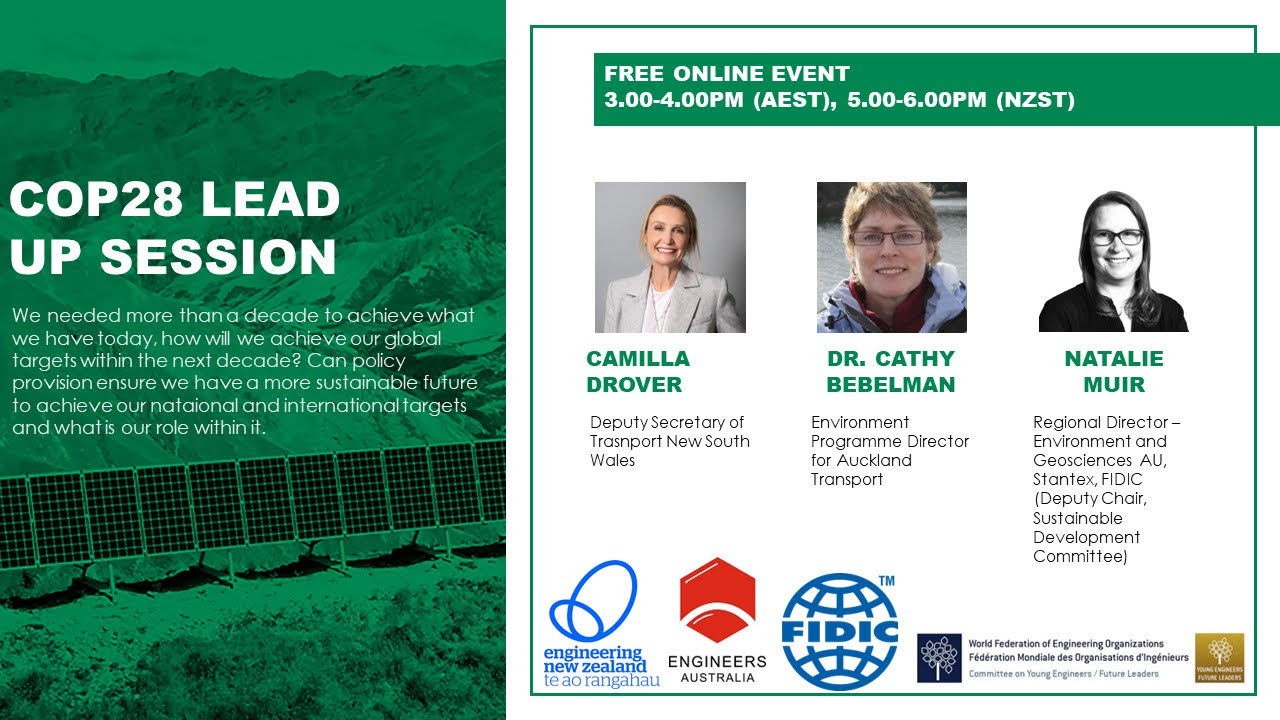
The WFEO Committee on Young Engineers / Future Leaders (YEFL) , Engineering New Zealand, Engineers Australia and FIDIC cordially invite you to attend the webinar COP28 Lead Up Session that will be held on 26 September 2023 at 3:00 pm – 4:00 pm AEST / 5:00 pm – 6:00 pm NZST / 7:00 am – 8:00 am CEST.
The registration link is: shorturl.at/ceyC6
We needed more than a decade to achieve what we have today, how will we achieve our global targets? Can policy provision ensure we have a more sustainable future as well as achieving The Paris Agreement target for 2030 and 2050?
As we approach COP28, and the world continues to experience significant impacts from climate change it has never been more critical to advocate for the change we desperately need. The climate has already warmed at an accelerated pace than initially predicted and the devastating impact has not spared any part of the globe from its unprecedented destruction. We are at a pivotal point in our lifetime and as young engineers we want to keep encouraging change from a governmental perspective.
The change we are currently seeing is a result of infrastructure investment over past decade which required significant funding and support to achieve this. The outcome of these investments is indicating positive outcomes with Sydney Light Rail being a good example. This is, however, a single form of investment in transport supporting one city. There are still significant issues to deal with on a greater scale including in other parts of Australasia such as Auckland with its flooding damages requiring $2 Billion (NZD) to recover of which $390m is to recover the road network and $820m is required to build resilience in the network.
With COP28 around the corner where policies are topical for the summit, how do we ensure policies are capturing the correct change focus and scale of effort across multiple infrastructure components providing mode shift, resilience and changing cities to be less car reliant by densification? How can this policy dictate the next decade’s funding to serve society and consequently provide better climate outcomes? Is there a way where a green economics modal is developed that provides a better weight to climate solutions than vehicle related benefits to truly capture the population proportion that benefit from rapid transport outcomes especially when land use change are prioritised with the rapid transport infrastructure.
Moderator:
- Waldo Posthumus, Senior Civil Engineer, Aurecon and Aotearoa (New Zealand), member of the WFEO Committee on Young Engineers / Future Leaders (YEFL)
Speakers:
- Camilla Drover, Deputy Secretary for Transport NSW (New South Wales)
- Dr Cathy Bebelman, Environment Programme Director for Auckland Transport
- Natalie Muir, Regional Director – Environment & Geosciences AU, Stantec and FIDIC representative
For more information:
